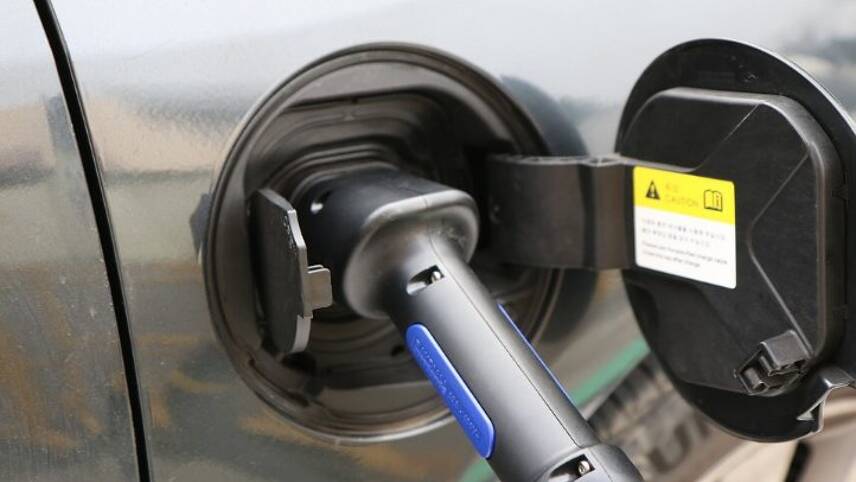Register for free and continue reading
Join our growing army of changemakers and get unlimited access to our premium content

The SMMT claims that there are currently 80 "alternatively fuelled" car lines on sale in the UK
The data, recorded by the Society of Motor Manufacturers and Traders (SMMT), shows that registrations of fully electric vehicles (EVs) were up 158% year-on-year, from 880 in July 2018 to 2,271 in July 2018.
Hybrid-electric vehicle registrations were also up by 34.2% within the same timeframe, while a whopping 331% increase in registrations was recorded for mild hybrid-electric vehicles with diesel capacity.
Plug-in hybrid electric vehicle (PHEV) registrations, however, were down 49.6% year-on-year. The decrease comes after the Department for Transport (DfT) altered its Plug-In Car Grant last Autumn, to reduce its grant for EV buyers by up to £1,000 per customer while removing some plug-in hybrid-electric models from the scheme altogether.
Nonetheless, SMMT claims that EVs accounted for a record proportion of overall UK car registrations last month, while new diesel car registrations were down by more than one-fifth (22.1%) year-on-year.
These trends come amid trying times for the UK’s car industry, with total July 2019 car registrations down 4.1% from the year prior. This drop off is being widely attributed – at least, in part – to Brexit, with automakers scrambling for reassurances that post-Brexit Britain will become a thriving hub for future product lines.
Commenting on the SMMT’s findings, the organisation’s chief executive Mike Hawes said that EVs are now on track to double their market share to 2.2% in 2020.
“Thanks to manufacturers’ investment in these new technologies over many years, these cars are coming to market in greater numbers than ever before,” Hawes said.
“If the UK is to meet its environmental ambitions, however, Government must create the right conditions to drive uptake, including long-term incentives and investment in infrastructure. The fastest way to address air quality concerns is through fleet renewal, so buyers need to be given the confidence to invest in the new, cleaner vehicles that best suit their driving needs, regardless of how they are powered.”
Driving towards net-zero?
Hawes is just one of many high-profile business figures to have urged the UK Government to do more in supporting businesses to decarbonise transport, after it enshrined a legally binding net-zero target for 2050 into law earlier this summer.
Transport it widely viewed as the Achilles heel of national decarbonisation efforts. It overtook the power industry as the most carbon-intense sector in 2016 and saw its emissions rise by 2% last year, with the main source of emissions deriving from the use of petrol and diesel.
In order to change this trajectory, the Committee on Climate Change (CCC) has recommended that the Government brings its 2040 ban on new petrol and diesel sales forward by at least eight years. Ministers had refused to move the date before net-zero was legislated and are yet to provide an update on whether their stance has changed.
The CCC has also criticised the Government’s existing strategy for decarbonising road transport and spurring the e-mobility revolution, called ‘Road to Zero’. The body has said that Ministers are failing to confirm financial support to domestic and business customers seeking to purchase electric vehicles (EVs) after 2020, invest into EV charging infrastructure and associated power system upgrades or require automakers to set long-term climate targets. Similarly, WWF’s head of climate and energy Gareth Redmond-King said that Road to Zero showed a “failure of climate leadership”.
Sarah George


In the interests of balance I’ve just seen this report which may be of interest.
https://www.investors.com/politics/editorials/electric-cars-co2-emissions-global-warming/
It’s simplistic to look at only one side of the equation – firstly the amount of CO2 generated in manufacturing EV is very high and then secondly (as the report shows) the net benefit isn’t anywhere near as much as we are led to believe.
The key to this is to increase our stable base load non carbon generating capacity – until we do this the benefits will be no where near as much as we think
When are manufacturers going to provide us with an all electric vehicle with better battery life. I was looking at a vehicle the other day with a battery life of 250 miles and as the sales person said that’s if you don’t have your lights on, the radio on the air con on or the heater or rear view demister plus the infrastructure for recharging isn’t very good. Is there any truth that if you rapid charge the battery it shortens its working life.
The life of lithium batteries is said to be about twelve years, and rapid charging can give rise to crystal growth which penetrates the battery diaphragm. This can cause fires. The true "pollution" to the environment of the complete construction of EVs seems to be a closed book. The power comes from the Grid, about half fossil fuel.
Bryan Davis closing sentence is the absolute nub of the matter, but we have no scientists or engineers in the political sector, they are all swayed by business lobbyists. Zero carbon is a total illusion.
I have heard of a set of chargers fed by a diesel generator.
Worth noting that leading academics from the universities in Italy and Brazil have written to their Governments, demanding an explanation of how CO2 is harmful, and explaining global warming from natural phenomena. The present panic will pauperise us.
Richard Phillips